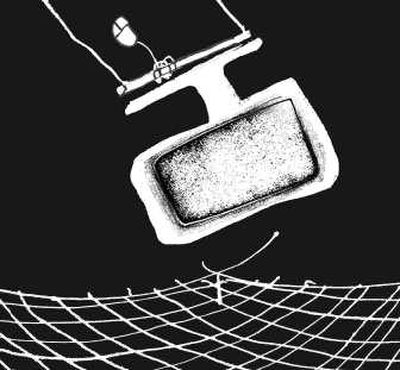Safety nets

Spokane massage therapist Chris Carson didn’t think he needed to back up his data regularly. And then it happened. Not once but twice, he ran into computer problems that ate all his digital documents, photos and music files. Today Carson uses Carbonite, one of several dozen options available for consumers looking for an online backup service. For about $50 a year, Carson makes sure Carbonite automatically backs up his home PC and stores all key files to an online server. He pays another $50 to back up his office machine with Carbonite as well.
“I always thought it wouldn’t happen to me,” said Carson. He hasn’t needed to restore key files yet, having just signed on with Carbonite a year ago.
The number of online backup services designed for the individual home or small business owner has surged in the past year. One Web survey found nearly 100 sites that offer the service, ranging from AllmyData.com to Xdrive.com. Some offer free backups with limited space options. Others charge varying rates, depending on length of contract.
Many offer assorted other options, such as access to data from any PC.
Security experts might debate whether it’s totally safe to store private financial data and encrypted passwords online. But most tech analysts say online storage is a great idea.
They also warn people like Carson that it’s only half the solution. Anyone using a computer should use both local backup and an online service, said Robin Harris, who covers the storage industry in his blog StorageMojo.com.
“Online storage is not a substitute for a regular local backup because networks are so slow. It will save your data in a disaster, but it is not going to restore it very fast. A local backup will do that in a few minutes,” said Harris by e-mail.
He also said the range of choices is dizzying but that not all the services are equal. People should look around carefully, he said. He likes services that offer free trials that give you a 15- to 30-day period to test the reliability and ease of use.
Other services have storage limits, as well. He recommends Mozy, which has a free account that allows up to 2 gigabytes of data storage. For about $55 per year, Mozy says you can go crazy, offering unlimited storage.
Harris said his preferred online backup services are Mozy and Carbonite. He favors them because, he said:
“Each offers unlimited storage. “Most folks have no idea how much data they have and they shouldn’t have to think about it.”
“Each has a reasonable price.
“Both are easy to use. “I have found that with Carbonite I have to do nothing, since it backs up automatically whenever I’m using the computer,” said Harris.
“Mozy, he’s found, works well with his Mac. Carbonite keeps telling customers they’ll offer that option but still hasn’t delivered, Harris noted.
“Also, Mozy encrypts your data before it leaves your PC,” which adds security, said Harris.
Harris and others say good research is important. If you don’t like the idea of having to restore everything you’ve lost via the Web, look for online services that give you the choice of redundant DVD copies. Carbonite, for one, does that – storing your selected data online, but also sending you DVD copies, which will let you restore key information quickly if that moment ever comes.
John Shovic, a North Idaho tech entrepreneur, is among those who doesn’t fully trust online backup. He’s especially leery of using services that would upload and potentially expose passwords to banks or investments.
For home users, he recommends using local media, like CD-ROM disks, USB devices or even old-school tape.
“I myself back up to USB disk drives and then move them out of the house occasionally,” said Shovic, who’s helped launch a number of local firms.
Shovic said anyone not backing up data is asking for pain.
“My favorite quote about backup is ‘In your business, which would you rather have happen: your building burning down or loss of all your computer data?’ ” he said. “The answer almost always is ‘It’s easier to replace a building than all my data.’ “